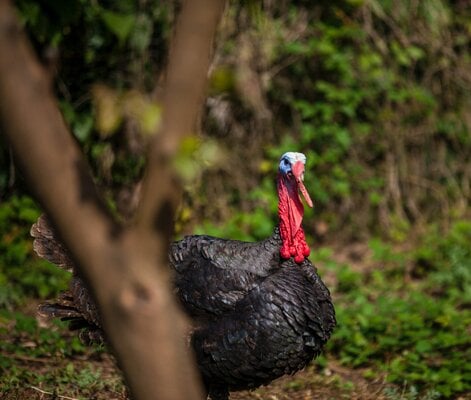There are several things to consider before deciding to raise turkeys.
Perhaps you've already raised chickens and are now thinking about plump, juicy turkeys for Thanksgiving and Christmas. Or you may be a small farmer with a business plan that involves raising, slaughtering, and selling meat animals. Whatever the reason, you're thinking about raising turkeys and wondering if they're right for your small farm or homestead.
If turkeys are the first animal you plan to keep on your farm, be aware of the responsibilities that come with raising and keeping farm animals. They need to be fed and watered daily, the coop needs to be cleaned, and if you're raising them for meat, you'll need to find someone to slaughter and process them or do it yourself.
First, there's a risk of a disease called "blackhead disease" that chickens can transmit to turkeys.
Second, chicks are quicker to mature than turkey poults when it comes to finding their way around and perceiving what's going on around them. So when chicks and poults are a few days old, the chicks can start pecking at the turkeys and possibly injure or even kill them.
And third, when the turkeys get a little older, they're much larger and more aggressive than the chickens and sometimes attack the chickens or fight with the roosters. Also, turkeys need to be fed differently than chicks (they need more protein).
For all these reasons, you should provide a space for your turkeys that's separate from the chickens. Turkeys need about 10 x 10 feet of space to raise ten to twelve-day-old poults, and the larger they get, the more space they need. Turkeys are most comfortable in a large fenced run, but also need some protection from the weather. Turkeys need about one-eighth of an acre or about 75 feet by 75 feet for a dozen turkeys.
Perhaps you've already raised chickens and are now thinking about plump, juicy turkeys for Thanksgiving and Christmas. Or you may be a small farmer with a business plan that involves raising, slaughtering, and selling meat animals. Whatever the reason, you're thinking about raising turkeys and wondering if they're right for your small farm or homestead.
Do you like turkeys?
Maybe it's a silly question, but it's always a good idea to spend some time with a farm animal before you invest in housing, fencing, and other needed supplies - and before you get live animals you're not so happy with. Visit farmer friends who keep turkeys. Talk to them about their experiences. Feed the turkeys and spend some time with them.Do You Have the Time?
Whether you're adding a new species to your operation or just adding another raised bed to your farm garden, consider whether you have the time to care for the new species. Raising turkeys isn't particularly difficult, but they're a little different from chickens in terms of their needs, and raising chicks is more time and energy consuming than raising chickens.If turkeys are the first animal you plan to keep on your farm, be aware of the responsibilities that come with raising and keeping farm animals. They need to be fed and watered daily, the coop needs to be cleaned, and if you're raising them for meat, you'll need to find someone to slaughter and process them or do it yourself.
Do You Have Space?
Turkey poults should be raised separately from chickens, not in the same coop or pen, for several reasons.First, there's a risk of a disease called "blackhead disease" that chickens can transmit to turkeys.
Second, chicks are quicker to mature than turkey poults when it comes to finding their way around and perceiving what's going on around them. So when chicks and poults are a few days old, the chicks can start pecking at the turkeys and possibly injure or even kill them.
And third, when the turkeys get a little older, they're much larger and more aggressive than the chickens and sometimes attack the chickens or fight with the roosters. Also, turkeys need to be fed differently than chicks (they need more protein).
For all these reasons, you should provide a space for your turkeys that's separate from the chickens. Turkeys need about 10 x 10 feet of space to raise ten to twelve-day-old poults, and the larger they get, the more space they need. Turkeys are most comfortable in a large fenced run, but also need some protection from the weather. Turkeys need about one-eighth of an acre or about 75 feet by 75 feet for a dozen turkeys.

